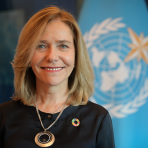WMO Secretary-General's Statement on the occasion of World Meteorological Day 2024
Happy World Meteorological Day.
As you know this is my first celebration of World Meteorological Day as Secretary-General of the World Meteorological Organization. Previously, I also celebrated this day at the Argentinean Meteorological Service, because it is a unique opportunity to increase awareness of who we are, what we do, and why we do it.
National Meteorological and Hydrological Services - WMO Members – are key players in our fight against climate change. Indeed, the WMO community provides tools and knowledge on both climate change mitigation and adaptation.
It is therefore fitting that the theme of this year’s World Meteorological Day is “At the Frontline of Climate Action.”
Climate Action means different things to different people.
But all agree that it is indispensable. And it is urgent. And it is a call for everybody. We must all pull in the same direction.
Our meteorological and hydrological communities gather, disseminate, and analyze weather, water, and environmental data. These are the basis for understanding what is happening with climate now and how it has been changing.
We cannot manage what we do not measure, and this is where WMO is ideally placed. We have a proud history of more than 150 years of sharing data and best practices. That is our strength.
We are building on that strength to provide information to support mitigation. For this reason, we launched the WMO’s Global Greenhouse Gas Watch. We need more measurements to support decision-making and climate action.
But mitigation is not enough. Adaptation is a MUST. For many, this is a matter of life and death.
As a matter of priority, hydrometeorological services around the world are engaged in improving their early warning systems, which are the linchpin of adaptation and disaster risk reduction.
However, as of today, many countries are not able to provide these early warnings to protect their people. This is why, as part of the global community, we embarked on the 'Early Warnings for All' initiative. Every person on Earth needs to have access to timely, authoritative, and life-saving weather and climate risk information by the end of 2027.
Climate and weather affect nearly every single activity. For instance, renewable energy systems, including wind, solar and hydropower; agricultural production; fisheries; transportation; and health. Weather and climate information fuels economic growth. We need to do more to turn climate science into services. And we need to make these climate services more accessible and to use them more efficiently.
On World Meteorological Day, National Meteorological and Hydrological Services take center stage. They are pivotal for risk reduction, development, adaptation, mitigation and sustainability.
We must ensure that their expertise feeds into high-level policy on climate action. As WMO Secretary-General, I am committed to working together with each NHMS to make sure that this value cycle is impactful at national, regional and global levels. This is about fostering inclusivity and sustainable pathways.
In the face of unprecedented environmental challenges, we are not mere observers. Rather, we are called to be game changers.
Our role as scientists and advocates for the planet has never been more crucial.
The lives of future generations are in our hands. Our efforts today will ensure a safer, healthier world for future generations—a world where children thrive in harmony with nature.
Together we stand at the Frontline of Climate Action as we leverage our collective expertise for the greater good and shape a resilient tomorrow.
I thank you.
Statement by


